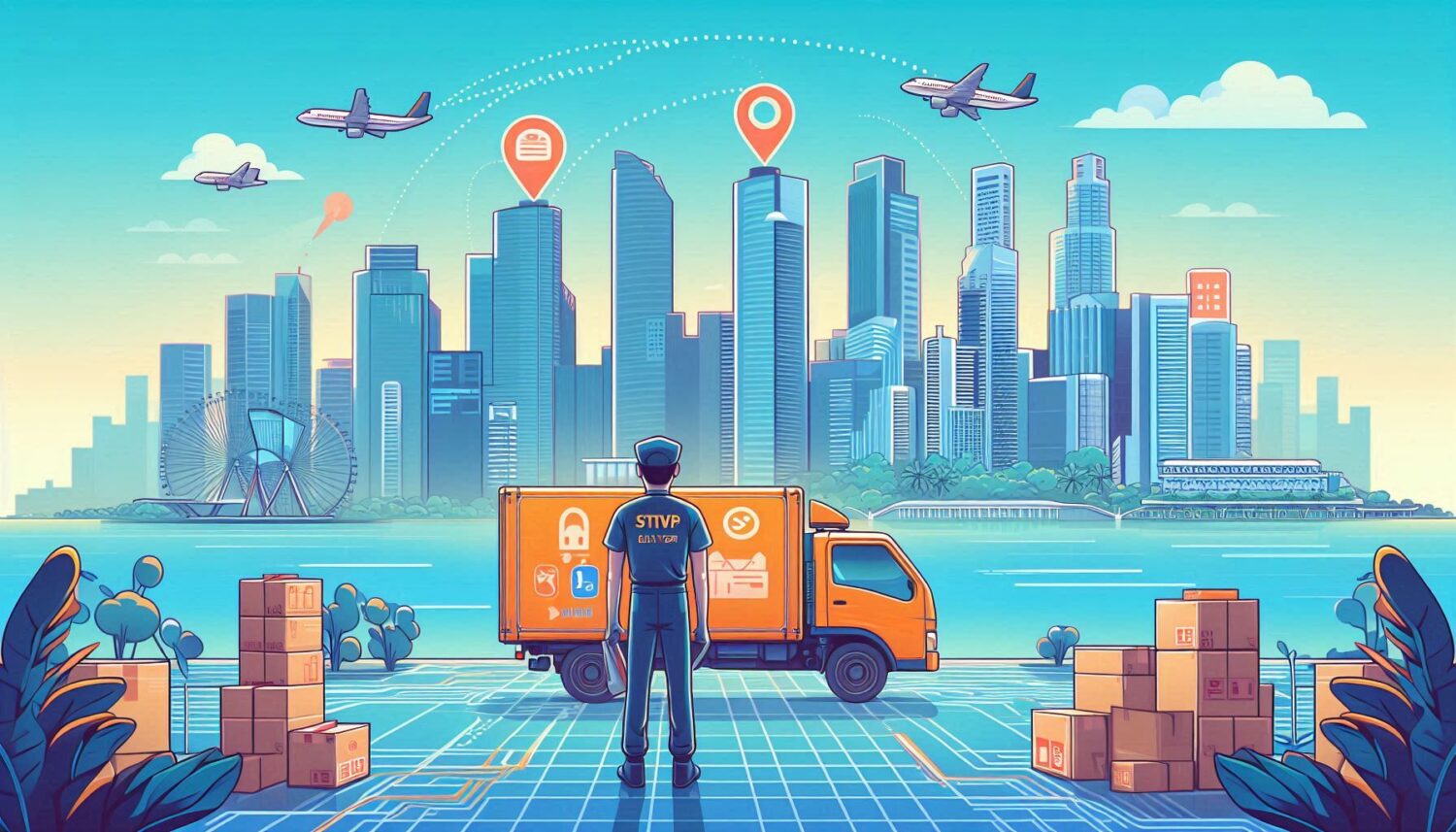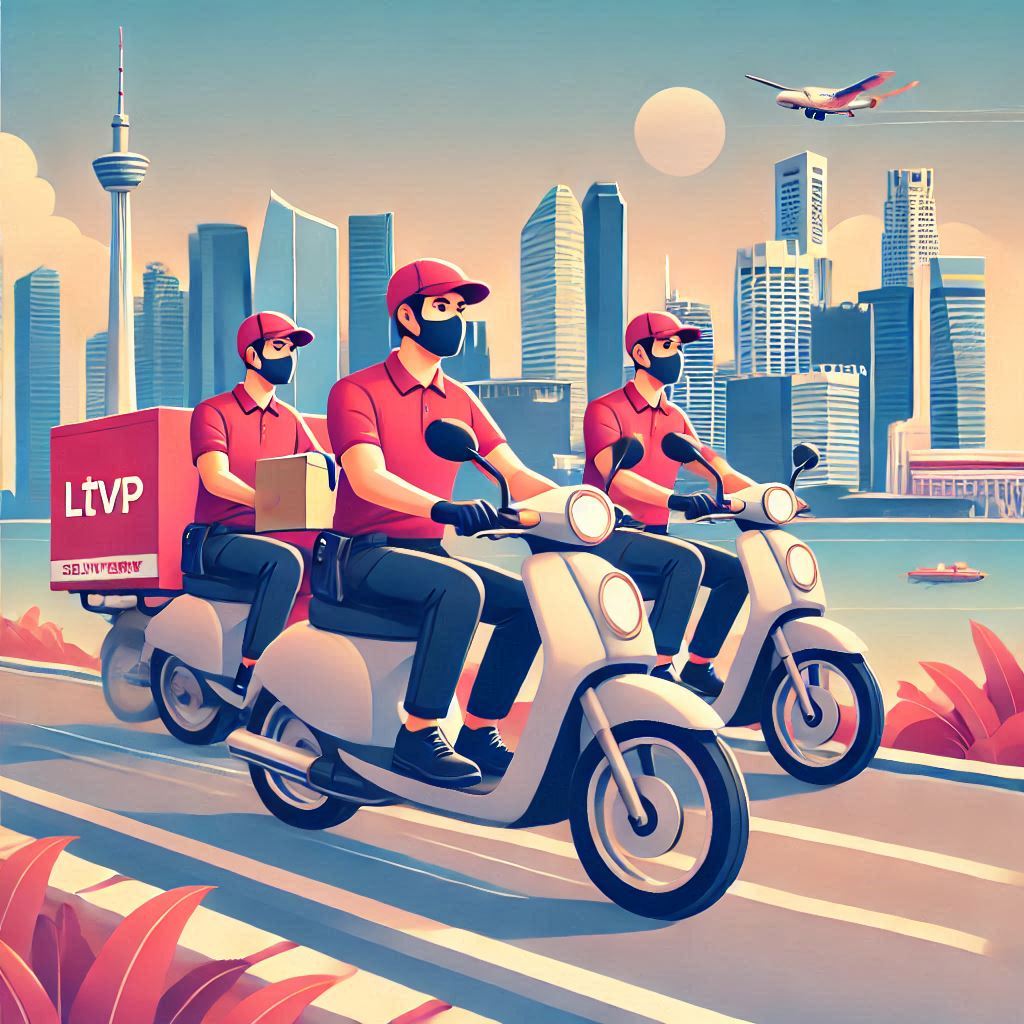In the thriving job market of Singapore, LTVP Delivery Jobs Singapore have become an essential part of the gig economy. The gig economy has seen rapid growth in Singapore, with food and parcel delivery jobs becoming a popular source of income for many residents. Among those taking advantage of this opportunity are Long-Term Visit Pass (LTVP) holders, who often seek flexible employment to support themselves and their families. However, while LTVP delivery jobs Singapore offers financial benefits and work flexibility, they also come with challenges, including legal restrictions, job security concerns, and financial instability.
This article explores whether LTVP delivery jobs Singapore are a game-changer for foreign spouses and dependents or if they pose significant risks. We will discuss the opportunities, legal considerations, challenges, and future outlook of delivery jobs for LTVP holders, providing insights for those considering this line of work.
The Rise of LTVP Delivery Jobs Singapore
Singapore’s thriving e-commerce and food delivery industry have fueled the demand for delivery riders and drivers. Companies like GrabFood, Deliveroo, Foodpanda, and Lalamove offer job opportunities that require minimal qualifications, making them an attractive choice for LTVP holders looking for income sources.
Several factors have contributed to the rise of delivery jobs:
- High Demand: Consumers increasingly rely on delivery services for convenience.
- Flexible Work Hours: Delivery jobs allow workers to set their own schedules.
- Low Entry Barriers: No specialized skills or degrees are required to start.
- Fast Income Generation: Earnings are received daily or weekly, making it easier to manage finances.
Despite these advantages, LTVP delivery jobs Singapore come with certain complexities, particularly regarding employment regulations and job stability.
Can LTVP Holders Work in Singapore?
LTVP holders, particularly those married to Singapore citizens or Permanent Residents (PRs), often seek work to contribute financially to their households. However, unlike Employment Pass (EP) or S Pass holders, LTVP holders do not automatically have work rights. They must apply for a Letter of Consent (LOC) from the Ministry of Manpower (MOM) if they wish to work.
Key points about employment for LTVP holders:
- LTVP holders married to Singapore citizens or PRs can apply for an LOC to work legally.
- LTVP holders without local family ties may face restrictions and are typically not eligible for an LOC.
- Without an LOC, LTVP holders cannot legally take on delivery jobs, even if they are self-employed.
- Some delivery platforms may not allow LTVP holders to register as riders due to legal limitations.
Before starting work, LTVP holders must verify their eligibility to avoid legal repercussions. Working without proper authorization can result in penalties, deportation, or restrictions on future applications for residency.
Advantages of LTVP Delivery Jobs Singapore

For LTVP holders who are eligible to work, delivery jobs offer several benefits that make them an appealing option.
1. Financial Independence and Supplemental Income
Many LTVP holders rely on their Singaporean spouses for financial support. Delivery jobs provide an opportunity to earn money independently, reducing financial dependence and contributing to household expenses.
2. Flexible Work Arrangements
Unlike traditional office jobs, delivery work allows LTVP holders to set their own schedules. This flexibility is particularly beneficial for parents, caregivers, or those managing other commitments. Riders can choose peak hours to maximize earnings while balancing personal responsibilities.
3. No Need for Extensive Qualifications
Many jobs in Singapore require specific educational backgrounds or professional certifications. Delivery jobs, however, have minimal entry requirements. As long as a person has a valid work permit, a registered vehicle (if applicable), and a smartphone, they can start working.
4. Immediate Earnings and Fast Payouts
One of the main attractions of delivery jobs is the quick payment system. Unlike salaried employment, where workers receive monthly paychecks, delivery riders are often paid weekly or even daily, making it easier to manage short-term financial needs.
5. Opportunity for Full-Time or Part-Time Work
LTVP holders can choose to work part-time or full-time, depending on their financial goals. Some may use delivery jobs as a stepping stone while seeking long-term employment, while others may pursue it as their primary source of income.
Challenges and Risks of LTVP Delivery Jobs
While delivery jobs provide flexibility and income, they also come with risks that LTVP holders must consider before committing to this line of work.
1. Legal Risks and Work Authorization Issues
The biggest challenge for LTVP holders is ensuring they have the proper work authorization. Many delivery platforms require legal employment status, and working without approval can lead to serious consequences. Some riders may attempt to work under another person’s account, which is illegal and can result in permanent bans or legal action.
2. Income Instability and Low Job Security
Unlike full-time employment with fixed salaries, delivery work is based on demand. During peak hours, riders can earn significant amounts, but earnings can fluctuate due to bad weather, increased competition, or changes in platform policies. There is no guarantee of a stable income, which can be stressful for those relying solely on delivery jobs.
3. High Work-Related Expenses
Delivery riders must cover fuel costs, vehicle maintenance, insurance, and mobile data expenses. These costs can significantly impact overall earnings, reducing take-home income. Additionally, personal accident insurance may be required, adding to the financial burden.
4. Physical Demands and Health Risks
Riding or cycling for long hours in Singapore’s tropical climate can be physically exhausting. Delivery riders are exposed to extreme heat, heavy rains, and road hazards, increasing the risk of accidents and health problems. Over time, prolonged riding can cause physical strain, making it important to maintain proper rest and hydration.
5. Competitive Market and Platform Policies
With more people joining the gig economy, competition among delivery riders is increasing. Platforms frequently adjust incentives, reduce base fares, or introduce new commission structures, impacting riders’ earnings. LTVP holders must adapt to these changes to remain profitable.
How to Succeed in LTVP Delivery Jobs Singapore

Despite the challenges, many LTVP holders have successfully built a steady income through delivery work. Here are some tips to maximize earnings and minimize risks.
- Verify Work Eligibility: Ensure you have the necessary work authorization before signing up for any delivery platform.
- Choose the Right Platform: Compare different delivery apps to find the most profitable and reliable option.
- Work During Peak Hours: Maximize earnings by working during lunch, dinner, and weekend rush hours.
- Maintain Your Vehicle: Regular maintenance reduces breakdowns and ensures smooth operations.
- Save for Unexpected Expenses: Set aside funds for vehicle repairs, medical emergencies, and slow business periods.
- Stay Updated on Platform Policies: Keep track of changes in commission rates, incentive structures, and work requirements.
By planning strategically, LTVP holders can optimize their delivery job experience while maintaining financial stability.
Future of LTVP Delivery Jobs Singapore
As Singapore’s gig economy continues to evolve, delivery jobs will remain a significant part of the workforce. However, regulatory changes may impact LTVP holders’ ability to work in this sector. The government may introduce stricter employment guidelines or modify work permit requirements, affecting eligibility for delivery jobs.
Additionally, technological advancements such as drone deliveries and autonomous vehicles could reduce the demand for human delivery riders in the future. While these innovations are still in the early stages, they may reshape the industry over time.
Impact of Government Policies on LTVP Delivery Jobs Singapore
Government policies play a crucial role in shaping the employment landscape for LTVP Delivery Jobs Singapore holders in Singapore. Regulations surrounding work authorization, employment rights, and gig economy participation can significantly impact their ability to take on delivery jobs. Periodic changes in labor laws, taxation policies, and insurance requirements may either create new opportunities or introduce further restrictions. LTVP Delivery Jobs Singapore holders should stay informed about policy updates from the Ministry of Manpower (MOM) and other relevant authorities to ensure they remain compliant while working in the gig economy.
Alternative Job Opportunities for LTVP Holders
While LTVP delivery jobs in Singapore offer flexibility and quick earnings, they are not the only employment option available. LTVP holders with specific skills can explore freelance work, online businesses, or customer service roles that provide greater stability. Some may also consider taking up short-term contracts in industries with high labor demand, such as retail, hospitality, or administrative support. By diversifying income streams, LTVP Delivery Jobs Singapore holders can reduce their dependence on gig economy jobs and build a more sustainable financial future.
Building a Long-Term Career in Singapore

For LTVP holders who plan to stay in Singapore for an extended period, it is essential to think beyond temporary gig work. Developing skills, obtaining relevant certifications, or transitioning into full-time employment can open doors to better career prospects. Those who secure a stable job may also strengthen their eligibility for permanent residency (PR), providing more security in the long run. While delivery jobs may serve as an immediate source of income, LTVP Delivery Jobs Singapore holders should consider long-term career planning to achieve financial and professional growth in Singapore.
Final Thoughts: Game-Changer or Risk?
LTVP delivery jobs Singapore offer both opportunities and risks. For those who meet the legal requirements, delivery work provides a flexible and accessible way to earn income. However, the lack of job security, physical demands, and regulatory uncertainties pose challenges that must be carefully considered.
Before entering the delivery job market, LTVP Delivery Jobs Singapore holders should assess their work eligibility, financial goals, and long-term career prospects. While delivery jobs can be a game-changer for some, others may find it a risky and unstable option.
For those looking to explore LTVP-friendly work opportunities, LTVP Delivery Jobs Singapore provides more insights and guidance on navigating the gig economy effectively.

I must say, LTVP delivery jobs have opened up new possibilities for many of us. The flexibilty it offers is indeed a game-changer.
Hi Zara, thank you for sharing your experience with LTVP delivery jobs. You’re absolutely right, flexibility is one of the major advantages of this job opportunity. As a team that empowers bicycle, ebike, and escooter enthusiasts, we understand the importance of flexibility and convenience. If you have any further concerns or need advice on managing your delivery schedule, feel free to drop us an email at [email protected] or give us a call at +65 8825 1000. We’re always here to help.
Agree! The job security concerns and financial instability are valid points, but with the right mindset and strategy, many have succeed in this gig economy.
We’re glad you agree with the importance of a right mindset and strategy in tackling the job security concerns and financial instability of LTVP delivery jobs Singapore. At Eko Life Malaysia, we believe in empowering individuals to take control of their financial lives through affordable, quality products and professional servicing. If you have any questions or need guidance on navigating the LTVP delivery job market, feel free to reach out to us at [email protected] or +65 8825 1000. We’re here to help!
The blog is spot on! As someone who has transitioned to delivery work from being a full-time homemaker, I can attest to the importance of planning and adapting to government policies.
Dear Nurul Syuhada, thank you for sharing your personal experience with us! It’s great to hear that you’ve found success in transition from being a homemaker to a delivery worker. Our blog is dedicated to providing helpful guides and information for those navigating similar journeys. If you have any more insights or questions, please don’t hesitate to reach out to us at [email protected] or call/Whatsapp +65 8825 1000.